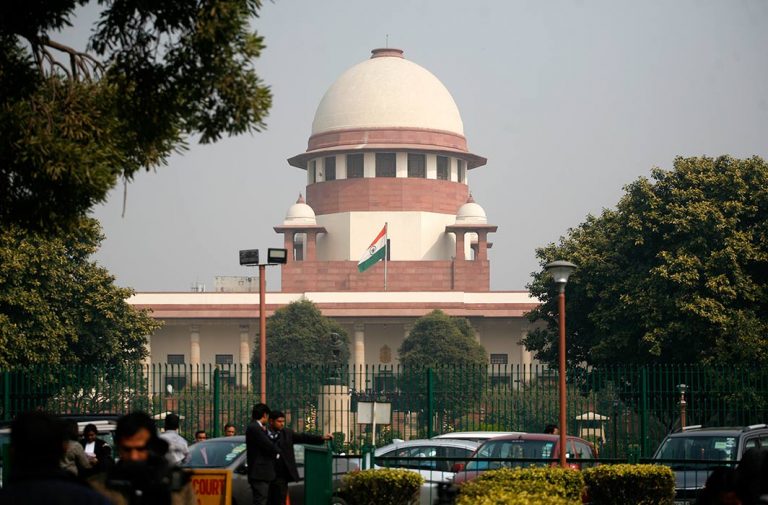
Supreme Court on 25th July has held in Ude Singh & ors v State of Haryana, that if the accused is found to have played an active role in tarnishing the self-esteem and self-respect of the victim, which eventually draws the victim to commit suicide, he can be held guilty of abetment of suicide.
A Division Bench of Justices Abhay Manohar Sapre and Dinesh Maheshwari set aside the conviction of one while affirming other convictions in the case adjudicated in the Punjab and Haryana High Court.
To put the facts in brief, due to family enmity, Hem Karan, Ude Singh, Manoj and Daulat Ram, were taunting the unmarried daughter (deceased victim) of the complainant by addressing her as “wife”, “Chachi” (aunt) and “Bohoria” (younger brother’s wife) besides incidents of physical and verbal abuses some of which were not reported to the police for the sake of the girl’s honour in the village. After one such incident, the girl cried the whole night and was found hanging by the neck the next morning.
Court has, in the course of laying down the judgement, has observed some key ingredients to be considered in the offence of ‘abetment of suicide’ under Sec 306 of the Indian Penal Code:
- In cases of alleged abetment of suicide, there must be a proof of direct or indirect act/s of incitement to the commission of suicide. It could hardly be disputed that the question of cause of a suicide, particularly in the context of an offence of abetment of suicide, remains a vexed one, involving multifaceted and complex attributes of human behaviour and responses/reactions. In the case of accusation for abetment of suicide, the Court would be looking for cogent and convincing proof of the act/s of incitement to the commission of suicide. In the case of suicide, mere allegation of harassment of the deceased by another person would not suffice unless there be such action on the part of the accused which compels the person to commit suicide; and such an offending action ought to be proximate to the time of occurrence. Whether a person has abetted in the commission of suicide by another or not, could only be gathered from the facts and circumstances of each case.
- For the purpose of finding out if a person has abetted commission of suicide by another, the consideration would be if the accused is guilty of the act of instigation of the act of suicide. Instigation means to goad, urge forward, provoke, incite or encourage to do an act. If the persons who committed suicide had been hypersensitive and the action of accused is otherwise not ordinarily expected to induce a similarly circumstanced person to commit suicide, it may not be safe to hold the accused guilty of abetment of suicide. But, on the other hand, if the accused by his acts and by his continuous course of conduct creates a situation which leads the deceased perceiving no other option except to commit suicide, the case may fall within the four-corners of Section 306 IPC. If the accused plays an active role in tarnishing the self-esteem and self-respect of the victim, which eventually draws the victim to commit suicide, the accused may be held guilty of abetment of suicide. The question of Mens Rea on the part of the accused in such cases would be examined with reference to the actual acts and deeds of the accused and if the acts and deeds are only of such nature where the accused intended nothing more than harassment or snap-show of anger, a particular case may fall short of the offence of abetment of suicide. However, if the accused kept on irritating or annoying the deceased by words or deeds until the deceased reacted or was provoked, a particular case may be that of abetment of suicide. Such being the matter of delicate analysis of human behaviour, each case is required to be examined on its own facts, while taking note of all the surrounding factors having bearing on the actions and psyche of the accused and the deceased.
- We may also observe that human mind could be affected and could react in myriad ways; and impact of one’s action on the mind of another carries several imponderables. Similar actions are dealt with differently by different persons; and so far a particular person’s reaction to any other human’s action is concerned, there is no specific theorem or yardstick to estimate or assess the same. Even in regard to the factors related with the question of harassment of a girl, many factors are to be considered like age, personality, upbringing, rural or urban set ups, education etc. Even the response to the ill-action of eve-teasing and its impact on a young girl could also vary for a variety of factors, including those of background, self confidence and upbringing. Hence, each case is required to be dealt with on its own facts and circumstances.
Court held that it was not a mere case of eve-teasing but a calculated step of repeated acts and utterances intended to bring disgrace to the girl and her family.
–India Legal Bureau

